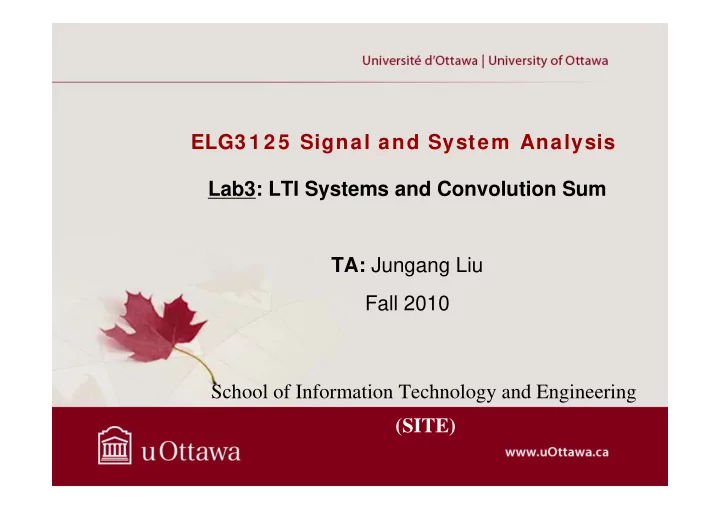

ELG3 1 2 5 Signal and System Analysis Lab3: LTI Systems and Convolution Sum TA: Jungang Liu Fall 2010 School of Information Technology and Engineering (SITE)
Outline 1. Differential equations 2. Difference equations 3. Convolution sums ELG3125 Signal and System Analysis Fall 2010 School of Information Technology and Engineering
Objective • To learn to simulate LTI systems in continuous time and discrete time, represented by differential equations, difference equations, or impulse response ELG3125 Signal and System Analysis Fall 2010 School of Information Technology and Engineering
Continuous-Time LTI System � N -th order linear constant-coefficient differential equation � Describe the system in Matlab ELG3125 Signal and System Analysis Fall 2010 School of Information Technology and Engineering
Continuous-Time LTI System � To find the impulse response h(t) of the system impulse(B,A,t) � To compute the output given the input x(t) lsim(B,A,x,t) See the related questions in the assignments ELG3125 Signal and System Analysis Fall 2010 School of Information Technology and Engineering
Example: Continuous-Time LTI System � 2ed order LTI system 2 d y ( t ) dy ( t ) dx ( t ) + + = + 2 3 y ( t ) 6 x ( t ) 2 dt dt dt = = [ 1 2 3 ] [ 0 1 6 ] A B � Coefficients are highest-order first from left to right in the vector ELG3125 Signal and System Analysis Fall 2010 School of Information Technology and Engineering
Discrete-Time LTI System � N th-order linear constant-coefficient difference equation � Describe the system in Matlab ELG3125 Signal and System Analysis Fall 2010 School of Information Technology and Engineering
Discrete-Time LTI System • To find the impulse response h[n] of the system impz(B,A,n) • To compute the output given the input x[n] filter(B,A,x) See the related questions in the assignments ELG3125 Signal and System Analysis Fall 2010 School of Information Technology and Engineering
Example: Discrete-Time LTI System • 3rd order LTI system + − + − + − = 2 [ ] 5 [ 1 ] [ 2 ] 8 [ 3 ] [ ] y n y n y n y n x n = = [ 2 5 1 8 ] [ 1 0 0 0 ] A B • Coefficients are most present time first from left to right in the vector • Using zeros() to create vector B B=[1,zeros(1,3)] ELG3125 Signal and System Analysis Fall 2010 School of Information Technology and Engineering
Convolution sum � Mathematical formula +∞ = − ∑ y [ n ] x [ k ] h [ n k ] = −∞ k = [ ] * [ ] x n h n = h [ n ] * x [ n ] ELG3125 Signal and System Analysis Fall 2010 School of Information Technology and Engineering
Convolution sum � Matlab function y=conv(x,h); � Length of signal x[n] length(x); See the related questions in the assignments ELG3125 Signal and System Analysis Fall 2010 School of Information Technology and Engineering
Learn How to Operate Music Files • Read a music file in Matlab Wavread() • Listen to the music Sound() See the related questions in the assignments ELG3125 Signal and System Analysis Fall 2010 School of Information Technology and Engineering
Enjoy convolution…… ELG3125 Signal and System Analysis Fall 2010 School of Information Technology and Engineering
Recommend
More recommend